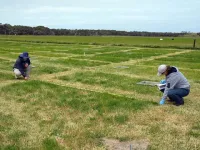Disagreeing takes up a lot of brain real estate
2021-01-13
(Press-News.org) Yale researchers have devised a way to peer into the brains of two people simultaneously while are engaged in discussion. What they found will not surprise anyone who has found themselves arguing about politics or social issues.
When two people agree, their brains exhibit a calm synchronicity of activity focused on sensory areas of the brain. When they disagree, however, many other regions of the brain involved in higher cognitive functions become mobilized as each individual combats the other's argument, a Yale-led research team reports Jan. 13 in the journal Frontiers of Human Neuroscience.
"Our entire brain is a social processing network," said senior author Joy Hirsch, the Elizabeth Mears and House Jameson Professor of Psychiatry and professor of comparative medicine and neuroscience. "However, it just takes a lot more brain real estate to disagree than to agree."
For the study, the researchers from Yale and the University College London recruited 38 adults who were asked to say whether they agreed or disagreed with a series of statements such as "same-sex marriage is a civil right" or "marijuana should be legalized." After matching up pairs based on their responses the researchers used an imaging technology called functional near-infrared spectroscopy to record their brain activity while they engaged in face-to-face discussions.
When the people were in agreement, brain activity was harmonious and tended to be concentrated on sensory areas of the brain such as the visual system, presumably in response to social cues from their partner. However, during disputes these areas of the brain were less active. Meanwhile, activity increased in the brain's frontal lobes, home of higher order executive functions.
"There is a synchronicity between the brains when we agree," Hirsch said. "But when we disagree, the neural coupling disconnects."
Understanding how our brains function while disagreeing or agreeing is particularly important in a polarized political environment, Hirsch noted.
In discord, she said, two brains engage many emotional and cognitive resources "like a symphony orchestra playing different music." In agreement, there "is less cognitive engagement and more social interaction between brains of the talkers, similar to a musical duet."
INFORMATION:
The lead investigator of the paper is Alex Salama-Manteau, a former graduate student of economics at Yale and now a data scientist at Airbnb. Mark Tiede, a research scientist at the Haskins Laboratory at Yale, is second author of the paper.
ELSE PRESS RELEASES FROM THIS DATE:
2021-01-13
A loss of biodiversity and accelerating climate change in the coming decades coupled with ignorance and inaction is threatening the survival of all species, including our very own, according to the experts from institutions including Stanford University, UCLA, and Flinders University.
The researchers state that world leaders need a 'cold shower' regarding the state of our environment, both to plan and act to avoid a ghastly future.
Lead author Professor Corey Bradshaw of Flinders University in Australia says he and his colleagues have summarised the state of the natural world in stark form to help clarify the gravity of the human predicament.
"Humanity is causing a ...
2021-01-13
Tsukuba, Japan - Work causes so much stress that it's become a global public health issue. Stress's impact on mental and physical health can also hurt productivity and result in economic loss. A new study now finds that working people who regularly take walks in forests or greenspaces may have higher stress-coping abilities.
In a study published in Public Health in Practice, researchers led by Professor Shinichiro Sasahara at the University of Tsukuba analyzed workers' "sense of coherence" (SOC) scores, demographic attributes, and their forest/greenspace walking habits. SOC comprises the triad of meaningfulness (finding a sense of meaning in life), comprehensibility (recognizing and understanding stress), and ...
2021-01-13
CLEVELAND, Ohio (Jan. 13, 2021)--If you're a bit more forgetful or having more difficulty processing complex concepts than in the past, the problem may be your menopause stage. A new study claims that menopause stage is a key determinant of cognition and, contrary to previous studies, shows that certain cognitive declines may continue into the postmenopause period. Study results are published online today in Menopause, the journal of The North American Menopause Society (NAMS).
It's commonly assumed that people's memories decline with age, as does their ability to learn new things and grasp challenging concepts. ...
2021-01-13
The ability of our skin to protect us from chemicals is something we inherit. Some people are less well-protected which could imply an increased risk of being afflicted by skin disease or cancer. A new study from Karolinska Institutet in Sweden that has been published in Environmental Health Perspectives shows how the rate of uptake of common chemicals is faster in people with a genetically weakened skin barrier.
We are continually exposed to chemicals from many different sources, for example, food, hygiene products, cosmetics and textiles. Many people are also exposed to chemicals at their place of work which can constitute a work environment problem.
The protein filaggrin is important for the structure and moisture balance of the skin, properties that affect ...
2021-01-13
January 13, 2021 - The element nitrogen is a double-edged sword. It is essential for growing plants and feeding people, but it is also a leading cause of pollution across the world. Only by using nitrogen more sustainably can the positive and harmful effects of nitrogen be balanced.
Xia (Emma) Liang, a member of the American Society of Agronomy, studies nitrogen loss during food production.
Liang and her team created a framework that accurately measures nitrogen loss across a wide variety of crops and food products. She recently presented their research at the virtual 2020 ASA-CSSA-SSSA Annual Meeting.
"This framework can capture the environmental impacts and societal costs of nitrogen ...
2021-01-13
A thermoelectric device is an energy conversion device that utilizes the voltage generated by the temperature difference between both ends of a material; it is capable of converting heat energy, such as waste heat from industrial sites, into electricity that can be used in daily life. Existing thermoelectric devices are rigid because they are composed of hard metal-based electrodes and semiconductors, hindering the full absorption of heat sources from uneven surfaces. Therefore, recent studies were actively conducted on the development of flexible thermoelectric devices capable of generating energy in close contact with various heat sources such as human skins and hot water pipes.
The Korea Institute of Science and Technology (KIST) announced ...
2021-01-13
A rare mineral that has allowed Roman concrete marine barriers to survive for more than 2,000 years has been found in the thick concrete walls of a decommissioned nuclear power plant in Japan. The formation of aluminous tobermorite increased the strength of the walls more than three times their design strength, Nagoya University researchers and colleagues report in the journal Materials and Design. The finding could help scientists develop stronger and more eco-friendly concrete.
"We found that cement hydrates and rock-forming minerals reacted in a way similar to what ...
2021-01-13
Researchers from University of Hawaii and University of Florida published a new paper in the Journal of Marketing that argues that a biological account of human behavior, especially undesirable behavior, will benefit human welfare. This biological perspective can complement traditional psychological, anthropological, and economic perspectives on consumption, particularly with respect to the vital topic of self-control.
The study, forthcoming in the Journal of Marketing, is titled "Consumer Self-Control and the Biological Sciences: Implications for Marketing Stakeholders" and is authored by Yanmei Zheng and Joe Alba.
Society's understanding of human ills is constantly evolving. Many ill-advised consumer behaviors are conventionally viewed through a non-biological ...
2021-01-13
CLEVELAND--The combined effectiveness of three COVID-prevention strategies on college campuses--mask-wearing, social distancing, and routine testing--are as effective in preventing coronavirus infections as the Pfizer and Moderna vaccines approved by the U.S. Food and Drug Administration (FDA), according to a new study co-authored by a Case Western Reserve University researcher.
The research, published in Annals of Internal Medicine, has immediate significance as college semesters are poised to start again--and as the distribution of approved vaccines lags behind goals.
The study found that a combination of just two common measures--distancing and mandatory masks--prevents 87% of campus COVID-19 infections and costs only $170 per infection prevented. ...
2021-01-13
New research from King's College London shows nearly half of Intensive Care Unit (ICU) staff are likely to meet the threshold for PTSD, severe anxiety or problem drinking during the COVID-19 pandemic.
Results from a study of ICU healthcare workers, published today in Occupational Medicine, shows the stark impact of working in critical care during the COVID-10 pandemic. The researchers found poor mental health was common in many ICU clinicians although they were more pronounced in nurses than in doctors or other healthcare professionals.
Lead author, Professor Neil Greenberg, from the Institute of Psychiatry, Psychology & Neuroscience (IoPPN), King's College London said:
'Our results show a substantial burden of mental health symptoms being reported by ICU staff towards the end ...
LAST 30 PRESS RELEASES:
[Press-News.org] Disagreeing takes up a lot of brain real estate




